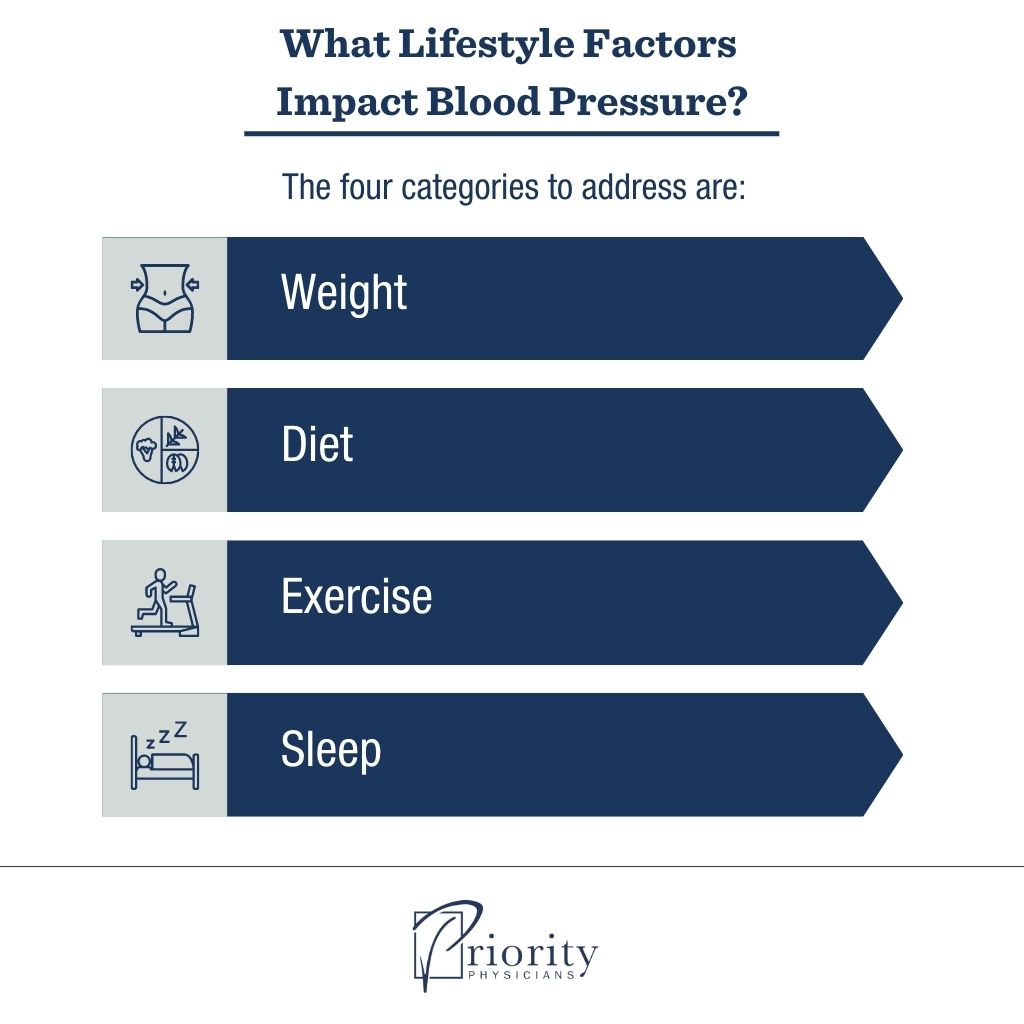High blood pressure is a risk factor for some of the worst diseases of humanity. In fact, high blood pressure is the number one cause of heart attack and stroke. It can also lead to vision loss, heart failure, kidney disease or failure, metabolic syndrome, and dementia.
This isn’t just a correlation; we know there’s causation here. And if your blood pressure climbs above 140/90, your risk of heart attack and stroke increases exponentially.
Clearly, high blood pressure is a serious health issue, and it’s one that’s best to address as early as possible. It could mean the difference between having a heart attack or stroke at 45 versus 85.
But not everyone wants to take medication when they discover high blood pressure at 35, or even 45. It feels too soon, and they want to try a lifestyle approach first.
The good news is that you can take steps to try to lower your blood pressure. It’s important to stay in coordination with your physician so that together you can monitor the effectiveness of these measures. Everyone is different, and what works for one person may not work for another. Generally, though, there are a few key categories of action that work for many people.
Here, we share how to lower high blood pressure without medication by addressing four key areas of your life.
3 Types of Factors That Impact Blood Pressure
First, three major types of factors impact blood pressure: medications, lifestyle, and environment. We talked a little about medications in a previous post, and we’ll cover environmental factors in a future post. In this post, we’re looking at how lifestyle factors can help lower high blood pressure without medication.
What Lifestyle Factors Impact Blood Pressure?
We’re defining lifestyle factors as things that you control. All of us have habits and rituals we follow daily, even if we aren’t aware of them. These unconscious patterns influence our blood pressure. If you’re trying to lower your blood pressure without using medication, then taking the reins of these lifestyle factors is how you start.
The four categories to address are:
- Weight
- Diet
- Exercise
- Sleep
How Does Weight Affect Blood Pressure?
There is a direct relationship between weight and blood pressure. As your weight goes up, your blood pressure goes up. But the reverse is also true. As your weight goes down, so does your blood pressure.
If you want to know how to lower blood your pressure without medication, this is a great place to start.
Losing as little as 5–10% of your body weight is the equivalent of taking one blood pressure medication. If you weigh 150 pounds, that’s 7–15 pounds standing between you and lower blood pressure. If you’re determined to avoid blood pressure medication, that’s an enemy you can zero in on.
Conversely, gaining 5–10% of your body weight will make your blood pressure rise. So if you lose that weight, remember the importance of keeping it off. Develop personalized strategies that will help you maintain a healthy weight — because weight is one of the most important factors for lowering your blood pressure without medication.
How Does Diet Affect Blood Pressure?
Diet has a huge effect on blood pressure. Of course, a healthy, balanced diet that includes fresh fruits and vegetables, whole grains, and lean proteins is good for everyone. But there are three specific factors in diet that have a major — and more immediate — impact on blood pressure.
Salt
Next to losing weight, reducing your salt intake is one of the most important things you can do to lower your blood pressure without medication. Salt plays a very clear role in blood pressure: If you eat more salt, you have higher blood pressure. It takes about a day to set in, but the effects are consistent and predictable.
The American diet is laden with salt. Even if you don’t add salt to your food, just about anything in a package, and certainly anything from a restaurant, is going to be saturated with sodium. So unless you’re actively trying to avoid excess salt, you’re getting too much.
Salt causes fluid retention. Think about your blood vessels like a closed system of pipes. The more fluid you have in the pipes, the higher the pressure will be. So when you eat more salt, you retain more fluid in your pipes, putting a strain on your heart and your blood vessel walls.
Hydration
After talking about how water retention is bad for blood pressure, it may seem counterintuitive to say that hydration is important. The key difference is that water retention happens in a diet high in sodium. Hydration helps combat that and flush it out.
The brain and heart are composed of about 73% water. They need water to function properly. When you’re well hydrated, your heart is able to pump blood more effectively throughout your body. When you’re dehydrated, your heart and other systems have to work extra hard, resulting in higher blood pressure.
Caffeine
A cup of morning coffee is a comforting daily ritual most of us don’t think too much about. But there’s some bad news about caffeine: It raises your blood pressure.
The same is true for caffeine from other sources, like sodas and energy drinks.
Caffeine is a vasoconstrictor, which means it narrows your blood vessels, making it harder for blood to flow through. This, of course, results in higher blood pressure. And it’s not over time; it’s right away.
If you’re looking for ways to lower your blood pressure without medication, reducing or eliminating your caffeine consumption is one. But that doesn’t mean you can’t have a warm cup of Joe in the morning. Just choose a decaf option instead.
How Does Physical Exercise Affect Blood Pressure?
Regular physical exercise lowers blood pressure. But if you’ve ever taken your blood pressure immediately after a workout session, you may notice that it’s elevated. And in the short term, it is. That’s because your heart was working hard to pump the blood you needed for your exercise.
It may seem counterintuitive, but this is actually a good thing. Why? Let’s think of blood vessels as pipes again.
When your blood vessels are stiff like a lead pipe, they don’t expand and contract. They’re rigid. So what happens when the pressure gets too high and there’s nowhere for that pressure to go? It explodes. Arteriosclerosis is the hardening of blood vessels, like a lead pipe. Couple this with high blood pressure and you have a ticking time bomb.
You want your blood vessels to be flexible, more like a garden hose. Then, they adapt to what’s needed. When the pressure rises, they expand. When the pressure lowers again, they contract.
When you exercise, you’re not just conditioning your muscles; you’re conditioning your blood vessels, too. And the flexibility you get from regular exercise keeps your blood pressure in check.
Any movement is good for your overall health, but for lowering your blood pressure specifically, you need to break a sweat. Only exercise that makes you sweat combats arteriosclerosis and keeps your vessels flexible.
How Does Sleep Affect Blood Pressure?
Sleep is another great way to manage high blood pressure without medication. Sleep is important to overall well-being in several ways.
First, you process stress while you sleep. If you don’t sleep enough or well, you can’t process your daily stress, and you hold on to it instead. This increases your blood pressure.
Second, your body uses sleep every night to rest, repair, and regulate itself. Regularly getting less than six or seven hours of sleep per night puts strain on the body and can lead to high blood pressure.
Finally, one sneaky but dangerous reason people lose quality sleep is obstructive sleep apnea. If you’ve suddenly been diagnosed with high blood pressure but maintain a healthy weight, diet, and exercise routine, this might be the culprit. A simple sleep test can diagnose obstructive sleep apnea, and treating the condition should lower your blood pressure.

Use Lifestyle to Lower Blood Pressure
High blood pressure builds over time, so the sooner you discover and treat it, the better. Implementing any of these strategies to lower blood pressure without medication can help, but be sure to stay in communication with your doctor. If your blood pressure doesn’t come down, you may need to consider medication — because uncontrolled high blood pressure causes a lot of damage to the body.
Ultimately, we want you to live the healthiest and longest life possible. If you can lower your blood pressure with lifestyle changes, we are absolutely all for that! But if you can’t, you’re not a failure. Remember, everyone is different. Find what works for you, and enjoy your best life.

